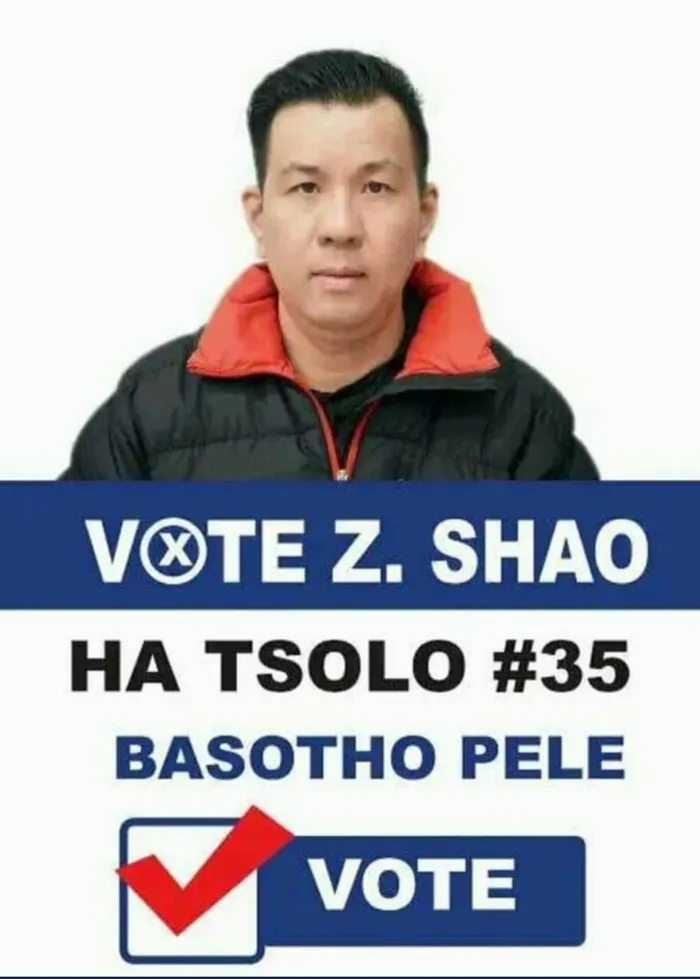Lesotho elections: whose campaign is it anyway?

Picture: Twitter
Graphic: Timothy Alexander/ African News Agency (ANA) – The electoral code of conduct aims to among others, promote conditions for free, fair and transparent elections, free political campaigning and open public debate, freedom from fear, coercion, intimidation and violence, as well as to ensure no defamation of character and misinformation, according to the statement issued by the Lesotho election authorities, the writer says.
By Chad Williams
Social media was abuzz this week at news that a Chinese man is allegedly campaigning for the office of the Prime Minister in the Kingdom of Lesotho.
An image surfaced showing the man in question on a campaign trail in rural Lesotho ahead of the October 7 election.
A poster bearing the name of “Z.Shao” also emerged and while it has been verified, it appears that some social media users are familiar with the man in question.


Lesotho's anticipated election
Lesotho’s election date was announced in a notice dated July 19 and signed by the head of the country's electoral commission, Mpaiphele Maqutu.
Last month, the chairperson of the Lesotho Independent Electoral Commission (IEC) Mphasa Mokhochane said since His Majesty declared the election period open, election campaigns, which would run for 90 days, could commence.
He was cited saying these particular election campaigns are different as they would be regulated by the electoral code of conduct that the Parliament of Lesotho has implemented.
Further, Mokhochane said that the code of conduct will assist party leaders, supporters and members of the public as the elections are a race that needs to be regulated and urged leaders to avoid statements that may cause conflicts or harass other leaders. He has also asked that posters and billboards for campaigns not be destroyed and has reminded leaders to remove billboards 24 hours before election day.
“Let us stop carrying guns and weapons during rallies as they (rallies) should reflect peace,” he was quoted saying and cautioned them against giving voters presents before elections, saying leaders are expected to elaborate and discuss the code of conduct during campaigns as this will contribute to peaceful elections.
Mokhochane also called on them to lead by example and reinforce common goals, saying they are expected to campaign fairly and avoid conflicts and said the IEC and leaders should encourage public participation and should do things in the open and provide transparent information.
Though most parties have signed, the Democratic Party of Lesotho, Socialist Revolution and Prayer Shawl and Rights have not signed on grounds that they are awaiting a meeting on Tuesday between the IEC and political leaders.
The electoral code of conduct aims to among others, promote conditions for free, fair and transparent elections, free political campaigning and open public debate, freedom from fear, coercion, intimidation and violence, as well as to ensure no defamation of character and misinformation, according to the statement issued by the Lesotho election authorities.
“While economic partnership remains the foundation of – and entry point for – China’s relations with African countries, Beijing is increasingly involved in political and electoral processes in African democracies, whether intentionally or coincidentally,” Caitlin Dearing Scott from Democracy in Africa wrote in 2021.
She says that despite China’s insistence that it will maintain at all costs its noninterference policy, and despite limited evidence of direct intervention in electoral processes, “there are increasing signs that it is willing to deploy economic incentives and political influence to achieve favourable electoral outcomes for pro-China politicians”.
But in the context of who is allowed to campaign to vote, the question of nationality or citizinery is often thrust into the spotlight.
For instance in the case of Lesotho, one would ask does Zao qualify to campaign? Was he born in the country? Should he be black to qualify?
In January 2021, Xiaomei Havard, a Chinese-born South African businesswoman and an African National Congress (ANC) politician from Gauteng who currently serves as a Member of Parliament, came under intense scrutiny after she was sworn in as MP.
Some leaders and citizens questioned her credentials and what qualified her to take up a seat in Parliament.
One of those that led the conversation on social media was ATM leader Vuyolwethu Zungula who posted on his Twitter page: "If a black person born in China can never be a member of the Chinese Parliament. Why does SA allow Chinese born person to be a member of the SA parliament and make laws for South Africans (sic)."
Former government spokesperson and ATM member Mzwanele Manyi also jumped in the fray saying: There's a weakness in the South African Constitution. No naturalised foreigner should qualify to be a public representative. Only native South Africans should qualify.“
But those in the ANC have stood by Havard saying the Constitution and their policies are geared towards a non-sexist, no racial society in which all can live in.
It will be interesting to see how well Z.Shao fairs in the upcoming elections give the interest around his campaigns how his constituency relates to him or whether it is still taboo for other nationals to hold office in African countries.
Chad Williams is a multimedia journalist with the African News Agency (ANA)
This article is original to the The African. To republish, see terms and conditions.